Just when you thought he couldn't get any better, Olympic champion Yuzuru Hanyu gave a performance for the ages on Saturday night.
For the second night in a row, Hanyu established a new world record on the way to victory at the NHK Trophy. Not just one, but two.
Skating before a raucous capacity crowd at Big Hat, Hanyu was nothing short of incredible as he earned a record score of 216.07 points for his free skate, which gave him a total of 322.40 for the competition, also a new world mark.
Hanyu topped the previous free skate record of 196.75 set by Patrick Chan at the Trophee Bompard in 2013 in Paris. Hanyu also topped Chan's total score of 295.27 set at the same Trophee Bompard.
So dominating was Hanyu's performance that he beat second-place finisher Jin Boyang of China (266.43) by more than 55 points. This after Jin had hit three quads and six triples of his own in the free skate.
Takahito Mura came in a respectable but distant third with 242.21, but was overshadowed by his more prominent teammate on this night.
World silver medalist and reigning national champion Satoko Miyahara comfortably won the women's competition with a total of 203.11.
American Courtney Hicks was second at 183.12, while three-time world champion Mao Asada settled for third on 182.99.
"I'm very, very excited right now. I don't know what to say," stated Hanyu. "I have to appreciate my coach and all of my teachers. This is not the 2014 or 2018 Olympics, so I want to continue to work to impress the audience."
Hanyu said he was focused on execution with his free skate.
"It was important to carry out each element carefully and with quality," he commented. "I know you (the media) were surprised by the score, but so was I. I just believed in my practice and performance."
Added Hanyu, "It's important to land quads with good quality. I tried five here between the short and free programs and was focused on more difficult entries and landings."
Hanyu took a lead of nearly 10 points into the free skate after establishing a new world of 106.33 points in Friday's short program. That score broke the mark of 101.45 that he set last year at the Sochi Olympics by nearly five points.
Skating to "Seimei" by Shigeru Umebayashi, Hanyu hit a quadruple salchow and quad toe loop at the outset of his program, then proceeded to add a quad toe loop/double toe loop combo along with seven triple jumps in an incredible display of athleticism and skill.
Once again Hanyu's line and edge were superb. He received level fours on all of his spins and his step sequence. It wasn't just that he did his elements well that resonated with the audience and judges, but he performed them all with style and panache.
The Sendai native, who will turn 21 on Dec. 7, received a lengthy standing ovation at the end of his performance as the ice was showered with flowers and gifts. Hanyu gave deep bows to all four sections of the arena before skating off the ice and into the arms of coach Brian Orser.
The 18-year-old Jin had planned an ambitious four quads for his free skate, but only landed three and received lower marks for grade of execution than Hanyu. Jin doubled his final planned quad (a toe loop) in an otherwise solid performance.
"I could carry out almost all of my components," Jin said. "I made some mistakes. I would like to improve my free skate so I can make a better performance."
In an example of the class that he personifies, Hanyu, in one of his finest hours, paid tribute to Jin.
"When I look at the future of figure skating (and quads), I see Boyang," he said of his younger rival.
The victory marked the second time that Hanyu has won the NHK Trophy. He also topped the podium in 2012 in Sendai.
The results in the men's event means that half of the field at the Grand Prix Final next month will be Japanese, with Hanyu, Shoma Uno and Daisuke Murakami all making the cut.
Jin also earned a berth in the GP Final, where reigning world champion Javier Fernandez and Chan will take part.
Miyahara competed to "Un Sospiro" and was steady as she almost always is. She landed seven triple jumps and received level four on two of her three spins and her step sequence.
"I was able to get good momentum from the start in this competition," Miyahara stated. "I'm happy I was able to perform both the short and free in a way that was satisfactory to me."
Miyahara qualified for the senior GP Final for the first time with the win and made it clear that she was elated.
"I am delighted to win and earn a place at the Grand Prix Final," she said. "That has been one of my goals for the season."
Hicks fell hard on a planned triple combo, but recovered to stay on the podium, narrowly edging out Mao for second place and earning a senior GP medal for the first time.
Mao skated to "Madame Butterfly" and was bedeviled once again by her beloved triple axel. She looked sharp in the six-minute warmup, hitting it several times, but could only double her opening jump.
Mao then doubled the back end of a planned triple flip/triple loop combo and later under-rotated a triple flip. Despite the error-filled program, Mao locked up a spot in the GP Final.
"I wasn't able to do well in the short and free," Mao commented. "I have a lot of work to do. There are several issues that have come to light. I need to focus on both the physical and mental aspects."
American Ashley Wagner also qualified for the GP Final after finishing fourth with 179.33. Also going to Barcelona, Spain, will be Wagner's compatriot Gracie Gold, and Russia's Evgenia Medvedeva and Elena Radionova.
Rika Hongo is the first alternate for the GP Final in the event that one of the aforementioned six skaters has to withdraw.
Canada's Meagan Duhamel and Eric Radford retained the lead after the short program to win the pairs comfortably with a total of 202.72.
China's Yu Xiaoyu and Jin Yang moved up from third following the short program to take second at 191.02
Americans Alexa Scimeca and Chris Knierim slipped from second and took third on 190.66.
All three pairs qualified for the GP Final based on their results here. Duhamel and Radford are the defending champions in the event.
Americans Maia and Alex Shibutani lead the ice dance after the short dance with a score of 68.08. The duo lead compatriots Madison Hubbell and Zachary Donohue (66.57), who are in second place, and Russia's Ekaterina Bobrova and Dmitri Soloviev (66.19), who stand in third.
The free dance is scheduled for Sunday afternoon prior to the Exhibition Gala.



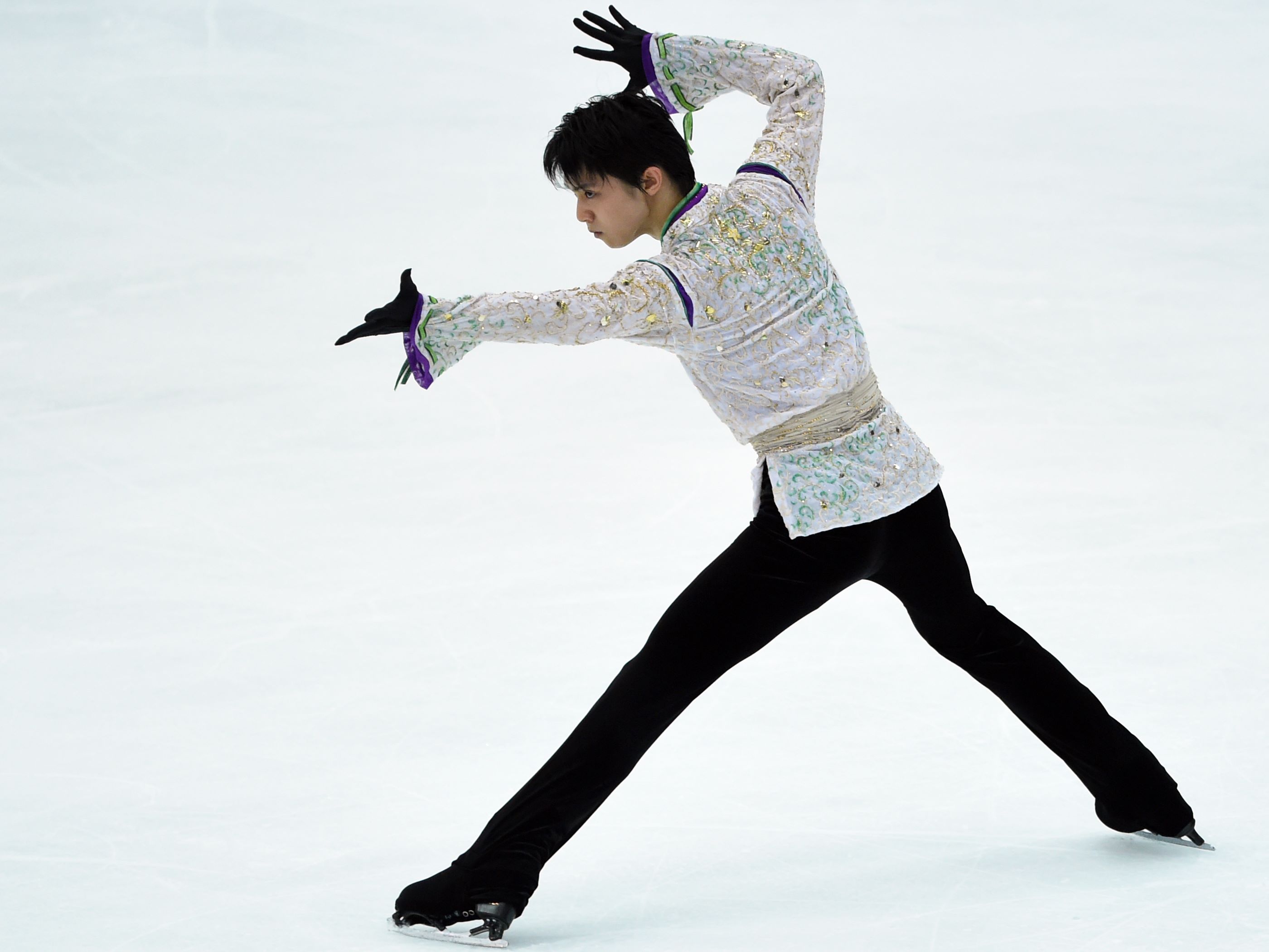
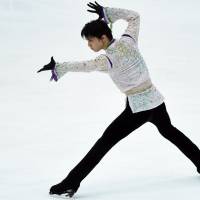
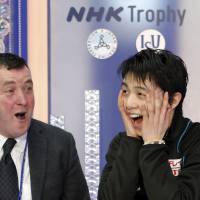
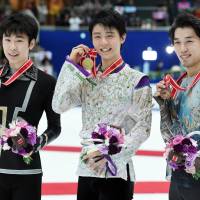
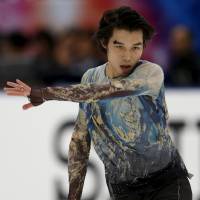
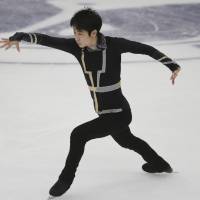
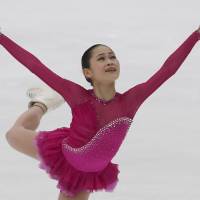
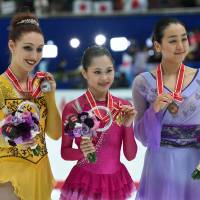
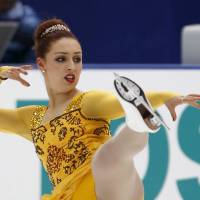
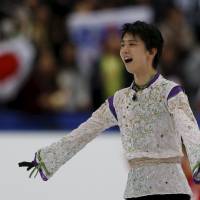














With your current subscription plan you can comment on stories. However, before writing your first comment, please create a display name in the Profile section of your subscriber account page.